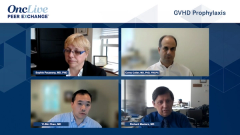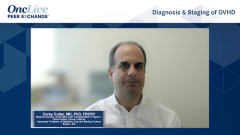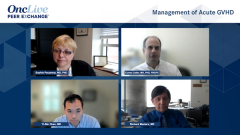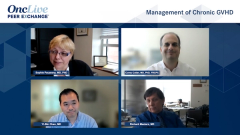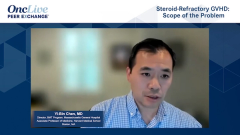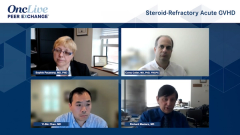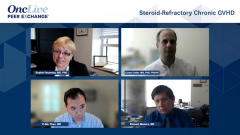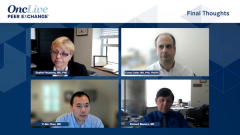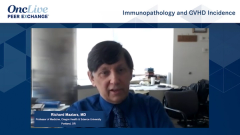
Management of Acute GVHD
Yi-Bin Chen, MD, leads a discussion on systemic treatment approaches being used currently for the management of acute graft-vs-host disease, as well as those being considered for the future.
Episodes in this series
Yi-Bin Chen, MD: I think we can all agree that standard first-line therapy systemically for acute graft-vs-host disease, unfortunately, remains high-dose systemic steroids. At our institution, our standard dose is 1 to 2 mgs/kg daily of prednisone or its IV equivalent. We somewhat base it upon what we think the severity of their disease is. For someone with severe gut GVHD [graft-vs-host disease], they are in the hospital getting IV methylprednisolone, and perhaps someone with just stage 3 skin GVHD with 60% of their body surface area involved might get a mg/kg of prednisone as an outpatient. Does anybody here differ from that approach generally, or use something else at this point?
Corey Cutler, MD, PhD, FRCPC: Other than that, we will enroll on a clinical trial for up-front therapy because as you were about to allude to, that approach is still unrewarding.
Yi-Bin Chen, MD: Yeah.
Richard Maziarz, MD: I will say we do the same. We use steroids, and we rely on the lymphotoxic capacity of steroids. It always strikes me when we have a new diagnosis GI [gastrointestinal] graft-vs-host patient, where we may have our gastroenterologist consulted because they can do a biopsy confirmation or we request it, and they agree with treatment with steroids, yet in treating inflammatory bowel disease the gastroenterologist increasingly gets away from using steroids as first line and starts using more antibody and antimetabolite therapy. I keep asking should we follow your lead? They then say, “Oh, it’s graft-vs-host [disease] and you should treat with high-dose steroids.”
Yi-Bin Chen, MD: I think we can all agree it’s been difficult the last couple of decades for those of us who have been involved in large collaborative trials where we think they’re going to end up improving the field, and after several years we end up with negative studies and get back to the drawing board. That’s unfortunately where we find ourselves, though hopefully we can make some progress. I think one of the biggest reasons for why that’s been the case is we’ve treated everyone the same, and we haven’t been able to distinguish patients biologically. Even the example I just gave; we’re just looking at presentation of what their symptoms are. Unfortunately, I think a lot of the series that drive that are based on maximum grade of GVHD and outcomes. When we see somebody on day 1 of presentation, we have no idea what their maximum rate is going to be. That is the fallacy in repeating that over and over again. That is the compelling draw of these new biomarkers, which are compelling in their retrospective analyses in suggesting that they may have an advantage over clinical judgment in predicting prognosis in terms of response to therapy or non-relapsed mortality.
One proposal I think that the field has had moving forward has been if we’re able to accurately risk stratify patients at diagnosis. Whether that be a clinical system, a biomarker system, both incorporated or something else; maybe we should do trials of steroids plus another agent on the high-risk group, and as Sophie mentioned, we would not do steroids on the low-risk group; there’s a group of acute GVHD patients that actually don’t need to be treated with steroids and we can use some alternative agent. Do you all agree with this approach going forward? Is this going to result in success and actually move the field?
Sophie Paczesny, MD, PhD: I think the trial was pretty impressive. For the high-risk patients, I believe you have to compare with corticosteroids. Some people will say maybe we should try something without corticosteroids, even for the high risk. I would think that is more valid for chronic GVHD. For acute GVHD, it might be a little bit risky. However for chronic GVHD, that is something that has been discussed at the NIH [National Institutes of Health] consensus recently.
Corey Cutler, MD, PhD, FRCPC: Even in the high-risk acute GVHD setting, there is a ton of toxicity from steroids; you can see an approach where you might get a very brief time-limited use of high-dose corticosteroids to immediately elicit an anti-inflammatory response, however the mainstay of your therapy is still a targeted or some other immunosuppressive-type agent. This is even in high-risk disease, and a combination of agents can also be used in that setting. But I think in the very near future, we are going to probably have steroids in acute GVHD as part of initial therapy.
Yi-Bin Chen, MD: Would you say, Corey, that no matter what risk in the treatment of acute GVHD, we all probably leave on steroids too long and aren’t aggressive enough about tapering? Would that be fair or not to say?
Corey Cutler, MD, PhD, FRCPC:. Unless you avoid using steroids entirely, which I’ve actually started to do in a couple of patients based on the [Joseph] Pidala [, MD, PhD, Moffit Cancer Center] paper; yes, I think the majority of us keep high-dose steroids ongoing when patients are not responding far too long. We all know what to do when patients respond—you taper as tolerated—but when patients require second- and third- and fourth-line therapy, it’s hard to gauge how much worse that patient would be without the steroid that they are getting. We don’t have a great algorithmic approach to what to do in those scenarios.
Yi-Bin Chen, MD: I think the other suggestion for low-risk patients, in addition to avoiding steroids all together and using another agent, would be to use steroids but taper much faster. We have realized that if we just let ourselves taper, we taper slow’ we only taper when we see patients, that’s just the nature of what we do. Prescribe then taper is given to patients for low-risk disease that may be another way to move the field forward in terms of reduction of morbidity.
There has been a lot of work done recently for acute GI GVHD which is the major organ that causes morbidity and mortality in looking at intestinal stem cells. We have all seen this work that a lot of our colleagues have done, showing that the intestinal stem cell niche is hugely important to the re-epithelialization of the GI tract; it may be the earliest site of attack in intestinal GVHD, which might explain why some of our patients no matter what we do, never seem to heal. There has been a movement towards trying agents that are not immunosuppressive nor anti–T-cell, but are more targeted toward improving organ resiliency. I mean that this is preservation of the intestinal stem cell niche. Richard, what do you think about these things?
Richard Maziarz, MD: I don’t know the exact study you’re talking about, but I do know that I think this is the premise; we’ll talk about it later when we talk about steroid-refractory GVHD. This is the premise for using mesenchymal stem cells or stromal cells. When you think about them, this is work that we did for a number of years, the cell is basically a sack of cytokines; they tend to have this biologic ability to home to sites of inflammation, they have cytokines that are secreted, that are immune suppressive, but also they are a source of growth factors. There was a study from the group at UCSF [University of California, San Francisco] showing that KGF, keratinocyte growth factor, is a cytokine that’s produced by the mesenchymal stromal cell. People have focused on using them for treatment of GVHD. There have also been studies which are provocative, that they may have benefit in prophylaxis. In that way, they will be doing 2 things: 1, they will suppress the immune system of the donor, and 2, they will also reconstitute the host microenvironment.
The KGF study is another that was done in the past, which was done to try and decrease the toxicity. We found that the community saw there was no really proven benefit in the allogeneic setting, but there were still issues about trial design where when you look at a chemotherapy myeloablative versus radiation-based myeloablative. In a subset analysis it seemed like there was differential responses possibly related to the dose schedule that was used, and the fact that radiation is more likely to have a greater toxicity to your intestinal stem cell. I think there are data, and I’m not current on the other drugs that are being used, but I certainly believe that that would be a tremendous approach toward ameliorating the situation.
Corey Cutler, MD, PhD, FRCPC:. I think what Yi-Bin might be alluding to is the IL-22 type approaches coming out of both Alan M. Hanash’s [, MD, PhD,] laboratory at [Memorial] Sloan Kettering, and then there’s a group from Shanghai that has a different construct; both of those are being tested. They aim to try to preserve the innate lymphoid cells that support the intestinal stem cells. There are other drugs that are used in short gut syndrome and other approaches here; maybe this is where the microbiome comes into play as well. I’m not sure we truly understand that terribly well.
Sophie Paczesny, MD, PhD: As far as cellular product, regulatory T-cells have been shown to really have … so much toxicity; we want to reconsider this. They don’t count T-regs now, they are … you can make the CAR [chimeric antigen receptor] T cells super specific for some antigen, allo-antigen, and so on. I think this is testable; at Stanford, Everett Meyer[MD, PhD,] is doing this and [Robert] Negrin [MD,] was doing this, and in Europe, too. That’s another approach. I think that will be more for steroid-refractory GVHD, but I think it’s worth to continue.
Yi-Bin Chen, MD: Overall, it will be interesting to see in the next few years which system we pick for stratification for GVHD biology. Ultimately, that will also inherently somewhat determine which agents are successful, and if these agents are successful in adding to our outcomes here. We must be quite collaborative in planning all this going forward.
Transcript edited for clarity.


